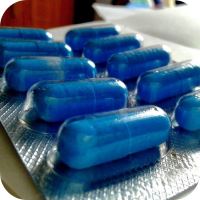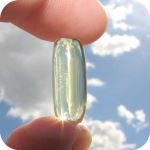 Having the correct balance of vitamins and minerals is essential for good male fertility. They help the sperm swim, increase sperm quality and quantity, and reduce damage to the sperm from environmental factors.
Having the correct balance of vitamins and minerals is essential for good male fertility. They help the sperm swim, increase sperm quality and quantity, and reduce damage to the sperm from environmental factors.
Providing you have a healthy balanced diet, you shouldn’t need to take any vitamin or mineral supplements, because you will get everything you need from your food (though women should take folic acid and vitamin D supplements regardless of how good their diet is). However, if your diet isn’t great or you just want peace of mind, you may want to consider taking supplements.
But you don’t need to take the supplements specifically labelled for fertility, as normal vitamin supplements with the right mix of vitamins will suffice. To help you choose a vitamin supplement, I have first listed the most important vitamins to increase fertility for men and what you need to know about them. Later on I cover how to avoid overdosing, supplement regulation differences and further guidance on picking the right supplement for you.
Vitamin C
Vitamin C is the best known vitamin for a wide range of health benefits, so it is no surprise that studies have shown that it improves sperm motility (the sperm’s ability to swim) and reduces the number of defective sperm.
Vitamin C Rich Vegetables
Peppers, broccoli, Brussel sprouts, cabbage and tomatoes (yes I know, tomatoes are technically a fruit).
Vitamin C Rich Fruits
Papaya, strawberries, kiwi, oranges, blackcurrants, grapefruit.
What Else Should I Know About Vitamin C?
Vitamin C does not stay in your body, so you need to include it in your diet every day. Vitamin C can easily be destroyed by overcooking food and may be in smaller quantities in foods that have been pasteurised (such as pasteurised orange juice). To get the most benefit, eat these foods raw or lightly steamed.
Vitamin C is especially important if you are a smoker, as it is one of the most effective nutrients to counteract the bad effects that smoking has on your fertility. If you are a smoker, you should consider taking vitamin C supplements as well as having it in your diet. Though don’t overdose on it, so keep your intake to under 1,000 mg per day.
Zinc
Zinc is one of the most beneficial nutrients for male fertility as it is important for sperm motility and is a powerful antioxidant. A lack of zinc can cause sperm to clump together, reducing their chances of reaching and fertilising the egg.
Zinc Rich Meats
Oysters, steak, venison, lamb.
Zinc Rich Vegetables
Spinach, green peas, white mushrooms.
Zinc Rich Seeds and Nuts
Pumpkin seeds, sesame seeds, cashews, pecans, almonds, walnuts, peanuts.
Other Zinc Rich Foods
Wheat, oats, eggs, 85% dark chocolate.
Arginine
L-arginine or just Arginine, is an amino acid thought to increase sperm count and improve sperm quality. As a bonus, it is also known to enhance erections as it increases blood flow around the body. Because of this, it is sometimes prescribed by urologists to treat erectile dysfunction.
Arginine Rich Seeds and Nuts
Almonds, walnuts, peanuts, sunflower seeds, pumpkin seeds.
Other Arginine Rich Foods
Chickpeas, lentils and kidney beans.
CoQ10
CoQ10 (or Coenzyme Q10) is a powerful antioxidant that is thought to improve the quality and motility of your sperm.
CoQ10 Rich Meats
Beef, pork, chicken, fish.
CoQ10 Rich Nuts and Seeds
Peanuts, pistachios, sesame seeds.
CoQ10 Rich Fruit and Vegetables
Oranges, strawberries, broccoli, cauliflower.
What Else Should I Know About CoQ10?
Be warned, if you are taking CoQ10 supplements rather than through natural foods, you may experience side effects. If you develop any of the following symptoms, stop taking the supplements immediately and speak to your pharmacist; diarrhoea, loss of appetite, nausea, stomach upset, skin rashes, trouble sleeping.
Selenium
Studies have shown that selenium can significantly increase sperm motility, however selenium is also toxic in high quantities. More than 400 micrograms per day (there are 1,000 micrograms in a single milligram) can cause health problems including; respiratory problems, stomach problems, headaches, loss of hair, loss of nails and garlic breath. I strongly recommend that you are very careful if you take selenium supplements and you should speak to your pharmacist if you have any doubts.
Selenium Rich Foods
Brazil nuts are a good natural source of selenium; however you only need to eat 1 Brazil nut per day to get all the selenium you require for healthy sperm. Regularly eating more than 3 Brazil nuts per day could lead to selenium poisoning (known medically as selenosis). Though don’t panic about last Christmas’s Brazil nut splurge, a one off is unlikely to kill you.
Instead of Brazil nuts, get small amounts of selenium quite safely by eating strawberries and sunflower seeds.
L-Carnitine
L-Carnitine is an amino acid that aids cellular metabolism (the chemical reactions that give your cells energy) and studies have linked it to improved sperm motility.
Sources of L-Carnitine
Your body should be producing enough L-Carnitine by itself, but you can boost the amount you get by having a diet rich in red meat. Though once your partner is pregnant I recommend you cut back down on red meat as high consumption can cause heart problems.
For a healthier source of L-Carnitine, it is found in smaller amounts in cheese, nuts, seeds, artichokes, asparagus, broccoli and Brussel sprouts.
Finally, L-Carnitine breaks down quickly with oxygen and some supplements may lose their potency once the packet has been opened. If you can find them, it is best to purchase supplements in blister packs (where the individual tablets are sealed separately).
Folate
Folate is also known as Vitamin B9 or Folic Acid (which is the synthetic form). It is very important for women as it increases their fertility and improves the chances of having a healthy child, but there is now some evidence that it may also increase the quality of sperm in men. While further studies are still needed to verify its benefits for men, it won’t do you any harm eating foods that are rich in it. After all, your partner definitely needs it and you can share the same meals.
Folate Rich Vegetables
Broccoli, spinach, Brussel sprouts, asparagus, celery, carrots, peas
Other Folate Rich Foods
Citrus fruits, lentils, avocado, strawberries, fortified breakfast cereals, fortified breads, and liver (though women trying for a baby should not have large amounts of liver)
Antioxidants
Oxidation is a chemical reaction essential for life. These chemical reactions can produce free radicals; atoms or molecules that are missing electrons. These free radicals are highly reactive and can interact with other atoms and molecules, in turn creating more free radicals and causing a chain reaction. When this happens within your body’s cells, it can damage them. Antioxidants prevent the free radical chain reaction by removing them.
Enough of the chemistry lesson because all you really need to know is that sperm cells are susceptible to the damage caused by free radicals and studies have shown that in some cases, taking antioxidants can greatly improve sperm quality.
Antioxidant Rich Foods
Vitamin C and Zinc are excellent antioxidants and I have already mentioned above which foods are good sources for them. Additional sources of antioxidants are Vitamin E and Beta-Carotene.
Antioxidant Vitamin E Rich Foods
Almonds, hazelnuts, sunflower seeds (and sunflower oil), spinach, broccoli, avocado, apricots, wheat germ (found in some breakfast cereals).
Antioxidant Beta-Carotene Rich Foods
Carrots, sweet potato, spinach, peppers, broccoli, lettuce, kale, squash, pumpkins, tomatoes, mangoes.
If you are a smoker or have been exposed to asbestos, avoid beta-carotene supplements as they have been linked to an increased risk of lung cancer. Speak to your doctor to get more information specifically tailored to your situation.
Vitamin D
There has been a lot of coverage of vitamin D in the press recently, but as far as I am aware, there are no studies that show conclusively that vitamin D impacts male fertility other than by generally improving your overall health (your overall health is definitely linked to your fertility). However, Vitamin D is very important for women, who should take supplements.
Given that Vitamin D is important for your general health and Vitamin D deficiency seems to be increasing globally, it certainly can’t hurt you to take it.
Male Fertility Supplements
The best source of vitamins and minerals for men wishing to improve their fertility is a balanced diet, which should supply you with everything you need. However, that is not always practical due to a busy lifestyle or the availability of certain foods where you live. In these cases, supplements can make up for any shortfalls you may have if you are not getting the right foods in your diet. Though be warned; it is possible to overdose on certain vitamins and minerals and not all supplements are created equally.
Overdosing on Vitamins and Minerals
As I have already specifically stated with selenium and CoQ10, it is possible to take too much of a good thing, but it isn’t just limited to those two vitamins. Taking too much of any vitamin or mineral can be bad for you (though some are far more difficult to overdose on than others) and you should always read the label before taking supplements. If you experience any unusual symptoms when taking supplements, stop taking them and consult your pharmacist.
Choosing the Right Supplement
Not all standard vitamin supplements have all the recommended vitamins and minerals needed to boost your fertility, so make sure you read the label to ensure it contains everything you need for strong healthy sperm. Also, some Vitamins can lose potency by exposure to oxygen and water, so it may be beneficial to buy supplements where the individual tablets are sealed separately (blister packs).
Herbal Food Supplements
Be warned, Herbal Food Supplements that claim to aid fertility can vary in quality. Look for supplements that fall under the Traditional Herbal Registration (THR) or Medicines and Healthcare Products Regulatory Authority (MHRA) as these are regulated and contain what they claim on the label.
Think carefully about taking Herbal Food Supplements that come under the remit of the Food Standards Agency (FSA), as their manufacture is not regulated and may not contain the quantities to those claimed on the label (though taking them should not be harmful to your health). It is not just supplements for fertility that suffer from this problem and you can read more about how Herbal Food Supplements can be misleading on the BBC News Site.






